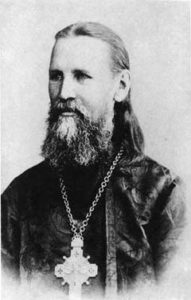Topic of the Week – Reversing Judgmental Thoughts
Since the enemy watches you constantly, waiting for an opportunity to sow evil in you, be doubly watchful over yourself, lest you fall in the nets spread for you.
As soon as he shows you some fault in your neighbor, hasten to repel this thought, lest it take root in you and grow. Cast it out, so that no trace is left in you, and replace it by the thought of the good qualities you know your neighbor to possess, or of those people generally should have.
If you still feel the impulse to pass judgment, add to this the truth that you are given no authority for this and that the moment you assume this authority you thereby make yourself worthy of judgment and condemnation, not before powerless men, but before God, the all-powerful Judge of all.
This reversal of thoughts is the strongest means, not only for repelling accidental critical thoughts, but also for completely freeing yourself of this vice.
— From Unseen Warfare, St. Theophan the Recluse and St. Nicodemus of the Holy Mountain
Adult/Family:
“…If anyone thinks that he has love but does not have the same love for all, but distinguishes between persons, separating the lowly from the rich, the infirm from the healthy, a sinner from a righteous man, one far off from one near, one who is an enemy from one who loves you, such love is not perfect, but partial.
Actual and perfect love consists in considering everyone and loving them equally, both those who love you and those who hate you. Such love, with which mercy is inseparable, is, in brief, a net for all the virtues. It embraces and contains all the commandments of God within itself. And if one can keep all the commandments, it is only he who can keep this. Therefore, we do not come to perfection and do not receive grace because we do not fulfill in perfection the commandments. To him who laid on the most pure breast of the Lord it is said in the Apocalypse, Be thou faithful unto death, and I will give thee a crown of life (Apoc 2:10). To conquer the world means to conquer with patience its wisdom and passions and every evil. That is, to suffer, to leave off one’s own habits and will which come from worldly wisdom, from world-loving life, and to be converted to spiritual life, not to do any evil at all, and to keep the commandments of God. For good deeds are a sacrifice to God. A broken and contrite heart, O God, Thou wilt not despise (Ps. 51:17).
Human passions, on the other hand, are sacrifices to demons. Man was created dispassionate; the passions in him occur from free will, but doing or not doing them. May the Lord preserve us from the passions….”
Excerpted from Saint Paisius Velichkovsky, Vol IV, Little Russian Philokalia, pp108-110
Preschool/Elementary:
“…I used to listen to a radio program on Voice of Russia World Service called Christian Message from Moscow. Each episode is unique and interesting. Sometimes they are narrations of Russian saints’ lives, other times they are stories of laypeople living their Orthodox faith in the world.
One episode in particular… made an impact on me in a real way. It was about a faithful nurse who worked at a local hospital and lived with a few older nuns, whom she took care of. She was very close to her spiritual father, and he had given her the obedience of reading the Psalter in its entirety every single day as a portion of her prayer rule.
As described in the program, she once bought an electric kettle – which was a rarity in those days- and she decided to bring it to the hospital to use in the lunch room. However, not long after she purchased it, a young nurse forgot to unplug it when she was finished. As a result, it burned, was ruined, and had to be discarded. When the Psalter-reading nurse found out, she was very upset and criticized the young nurse severely for her negligence, point out that she had to be stupid to have left the kettle plugged in.
About a week later, she was at a friend’s home when she noticed a lot of firetrucks driving by. She thought little of it, but when she returned home she found the firefighters surrounding her home. She realized at that moment it was, in fact, her own home that had caught fire. The old nuns were being taken out of the house and brought to safety just as she was arriving. She was horrified at the scene she saw before her. It turned out, a fireman informed her, that the fire had started in the kindling box. Someone had negligently put some smoldering coal into the kindling box, and it caused the fire. That someone was her.
Well, it didn’t take her long to realize what had happened. She quickly understood that because she had criticized the young nurse for leaving the electric kettle plugged in, God allowed her to act in a similar negligent manner so as to teach her the severity of the sin of judgment and criticizing…
If we judge someone, God will allow us to fall into a similar sin, or at best temptation, to humble us….“
Middle School:
Skin Deep Judgments
Her long, stylish dyed hair, perfectly manicured nails, long eyelashes, and skillfully applied make-up surprised me the first few times I saw her in church. She was pious, attentive, and prayerful. These latter qualities made me perplexed as to why she seemed to try so hard to make her outward appearance beautiful when her inner person shone with beauty. The more I got to know her, the more perplexed I became.
She impressed me so much with her depth of knowledge and enthusiasm for her faith. But still, that nagging question wouldn’t be silenced: Why? Why, if she was so spiritual, would she spend so much time on her appearance? These are the thoughts – the honest if cruel thoughts – of a judgmental person.
Driving back home from the baptism of our mutual friend’s baby, we were story-swapping, telling each other various details of our lives and journeys in the Orthodox Faith. She told us about a pilgrimage she had taken to the Holy Land. They had visited St. Saava’s Monastery in Palestine. This monastery, like Mount Athos, is closed to women visitors. While the men in the group went into the monastery compound, the women were escorted to an area where they were offered water and a sweet.
She told me that day she was wearing no make-up except on her eyes. But she was wearing larger sugnlasses so that her make-up wouldn’t be noticeable. Despite this, a monk from St. Saavas approached her and with pain in his voice said, “My child, why do you paint your face? Don’t you know it’s a sin to obstruct the image of God?” Hearing the monk’s words, she was surprised and speechless. He continued, “I will pray for you not to paint your face.” This simple conversation had a great and lasting impact on her.
Finishing her story, she looked at me in the rear-view mirror (I was sitting in the backseat) and said, “Constantina, will you pray for me to stop wearing make-up?”
Now it was my turn to be surprised, and I quickly answered, “Yes.”
She repeated herself, “Will you pray for me to stop wearing make-up?” And again I said yes.
What a lesson I learned that day! Who am I ever to ask that dreadful, damaging three-letter question: W-H-Y? Who am I to look on someone and form any kind of judgment about their appearance, any kind of judgment about their internal state? Her struggle is her struggle; we each have our own.
Having her look me straight in the eyes and appeal for me to pray for her cut me to the quick. I had rashly judged her, and there she was asking for my prayers. I hope through her prayers, I will struggle against that judgmental and condemning involuntary question that arises in my heart when I see something or someone I don’t understand. We never know what someone is working through and where they are on their spiritual journey. We make judgments based on what we see, but they are only skin-deep judgments. If only we knew people’s hearts, their struggles, we would pray instead of entertaining the judgmental “whys” that come to us- that come to me most of all.
Abba Dorotheos writes:
Should we not tremble hearing what happened to that great father who, when he heard that a certain brother had committed [a sin], said: ‘Oh, he did badly.’ Do you not know what a terrible thing is said about him in the Sayings of the Fathers? It is said that the holy angel brought the soul of the sinner to him and said: “Look. This is the person that you have judged, he is dead. Where do you command that he should be put, in the Kingdom or in Hell?’ What could be more terrible than this burden?”
High School:
“Whatever’s wrong with people is coincidental. Don’t look down on anybody even if you see how immoral, prone to drink or blasphemous they are. The image of God is in them, somewhere, too, although, of course, they aren’t aware of it.
It’s natural for the enemy to come and besmirch that image.It’s not easy to see the image of God in those who mock you and behave like brutes towards you. You should feel even more sorry for them because their souls have been distorted, to the extent that perhaps they’re beyond correction, which will condemn them to eternal torment.
How difficult is this: Love your enemies!”
~ Blessed Gabriel the New Confessor and Fool for Christ, from Georgia
Taken from Wisdom of the Church Fathers | St Vasilios Greek Orthodox Church (stvasiliosbrunswick.com)
 “A true Christian behaves in this life so that it may be a preparation for the future one and not only a life here below. In his actions, he does not think what will be said of him here but of what will be said there in heaven; he represents to himself that he is always in the presence of God, of the angels and all the saints, and remembers that someday they will bear witness of his thoughts, words, and deeds.” — Saint John of Kronstadt
“A true Christian behaves in this life so that it may be a preparation for the future one and not only a life here below. In his actions, he does not think what will be said of him here but of what will be said there in heaven; he represents to himself that he is always in the presence of God, of the angels and all the saints, and remembers that someday they will bear witness of his thoughts, words, and deeds.” — Saint John of Kronstadt







